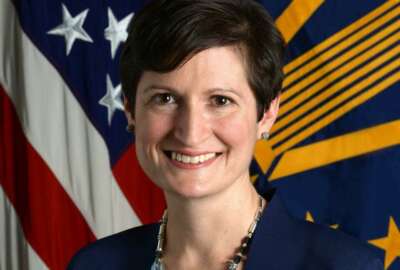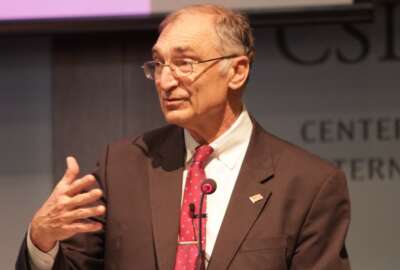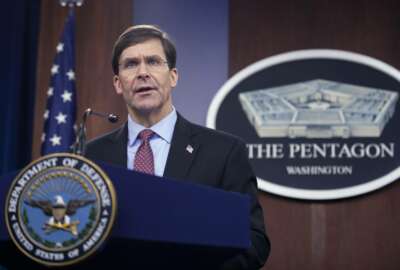
New certification program for Defense Security Cooperation Agency employees
The Defense Security Cooperation Agency has launched a certification program for people in the security cooperation workforce.
Best listening experience is on Chrome, Firefox or Safari. Subscribe to Federal Drive’s daily audio interviews on Apple Podcasts or PodcastOne.
In the real world of military preparedness, even the United States operates with the help and cooperation of other nations’ forces. Much of the relationship building and training comes under the auspices of the Defense Security Cooperation Agency. Now that agency has launched a certification program for people in the security cooperation workforce. For its aims and how the certification will work, president of Defense Security Cooperation University Cara Abercrombie spoke with the Federal Drive with Tom Temin.
Interview transcript:
Tom Temin: Ms. Abercrombie, good to have you on.
Cara Abercrombie: Thanks for having me.
Tom Temin: So tell us about this program of certification. Describe maybe the security cooperation workforce and who can participate in the certification program.
Cara Abercrombie: As you mentioned in your introduction, security cooperation is a term of art we use in the department, [to] describe all the programs and activities at DoD undertakes with our allied and partner foreign security forces and their institutions to help build, improve partner operational and institutional capacity. And we do this because it’s in our mutual interest. And so the workforce that supports this is pretty large and pretty diverse. We are looking at a population of more than 20,000 civilian and military officials or positions across the department.
Tom Temin: Wow!
Cara Abercrombie: : Yes, and they fall, I would say largely working for the service is the Army, the Navy and the Air Force. About three-quarters of the workforce works for the services, but these include positions at our combatant commands, working out of our U. S. Embassies worldwide in the Office of the Secretary of Defense, the joint staff and numerous field activities and agencies.
Tom Temin: And so this purpose of certification, then, is to do what? Since they’re already working in the field, somebody must have thought, yeah, you belong here?
Cara Abercrombie: That’s right. So in 2017, and the National Defense Authorization Act passed in 2016, Congress directed the secretary of Defense and more specifically, the Defense Security Cooperation Agency to develop this security cooperation workforce development program. And the intent was they wanted us to develop and manage a professional workforce to support the security cooperation enterprise because there was a sense that we needed to improve the quality and professionalism of the workforce. This is not to say that they’re not professional. These are some of the most professional civil servants and military officers I’ve ever had the pleasure to work with. But we weren’t a professional work-force, and we wanted to ensure that these individuals have the skills required to perform the mission to ensure that when they entered positions in the workforce, they did so with the appropriate level of expertise and experience, and beyond that, to ensure that these experienced and certified individuals were getting assigned two key decision-making positions in the workforce. You know, before the certification program, some folks got training, some didn’t. But because we weren’t a standalone recognized work force in the sense that maybe our acquisition or financial management counterparts are, these individuals were not getting trained to a common standard. There wasn’t any expectation that we would do so. And so we have people coming into positions, some of them significant decision making positions without really a holistic understanding of what security cooperation is, let alone the complex web of policies, regulations, practices that govern the way we conduct security cooperation.
Tom Temin: All right, and just a quick question on the Defense Security Cooperation University itself. Where does it lie in the hierarchy of the very large defense education complex?
Cara Abercrombie: That’s a great question. So we are the newest DoD university. We were created to support this program specifically. So we officially opened our doors on Sept. 25, 2019. And part of the legislation when DoD was directed to create this workforce development program, they also directed us to create a school to train, educate and certify the workforce. And so that’s what DSCU is. We are complementary to other DoD educational institutions. We are not meant to supplant any of the well known joint professional military educational schoolhouses. Our primary goal really is to educate this workforce. Secondarily, we also serve as the center of excellence for security cooperation education and training. And by that I mean we’re developing curriculum that we’re looking to share with other joint professional military educational institutions so that we can reach a broader population, not just those currently in our positions. These are up-and-coming military leaders who may find themselves in a security cooperation position someday that we want to make sure they’re aware of this line of effort.
Tom Temin: We’re speaking with Cara Abercrombie, she’s president of Defense Security Cooperation University. And so do you have a physical schoolhouse? You mentioned opening the doors, are there actual physical doors?
Cara Abercrombie: Yes, there are. We do have a small campus in Arlington, just down the road from the Pentagon in Crystal City, and we also maintain a small schoolhouse building at Wright Patterson Air Force Base in Dayton, Ohio, that we’re calling DSCU West. They previously were known as the Defense Institute of Security Cooperation Studies, and they to-date have done the bulk of tradecraft training for some members of the workforce, but not all.
Tom Temin: And tell us about some of the jobs that people in the workforce do and what some of the corresponding courses that you will offer will train them in.
Cara Abercrombie: Sure, so again, very diverse, and I think members of the federal workforce will appreciate — to give you a sense of the scope and breadth and depth of this workforce among the civilians, while we represent more than 150 jobs series and the tasks that we engage in are as varied as designing security cooperation programs, perhaps that the geographic combatant commands or out of our embassies overseas. We include professionals who are doing the acquisition work to provide defense articles on behalf of our partners, overseeing the logistics of getting defense articles to partners, the financial management of programs and sales — grant programs, overseeing training and education programs for partners. So it’s really a diverse workforce. So when we looked at designing curriculum to support them, we sort of had two objectives. One is, again, to give a common understanding of key competencies that everyone in the workforce should know, and we do that in our basic level curriculum. But we do have a four-tiered certification program, so individuals whose positions require a higher level of certification will get more job-specific training. So, really, the how to build a foreign military sales case or the how-to do the acquisition of, on behalf of a foreign partner. And those courses we are actually doing it in concert with the Defense Acquisition University.
Tom Temin: And you mentioned there 20,000 people in this line of work. How many do you expect to certify, say, in the first year of operation?
Cara Abercrombie: I’m really proud of how we approach the certification program. We said this first year is a transition year. So we started the certification program launched officially on Jan. 2, so members of the workforce may become certified. But we’re not making it mandatory until next January, 2021. So in this first year, we’re giving the community an opportunity to get familiar with the program, get familiar with the course where and how to register online, etc. So our goal for this first year, I would say, is a few hundred to a few thousand. But really, my primary goal is to ensure that we’re reaching individuals across the enterprise so that it’s representative of the workforce as a whole. But we believe we can successfully have everyone in the workforce at least basic certified by the end of 2022.
Tom Temin: Wow! And does this include, or could it include potentially, at some point, people in the allied agencies? Because I imagine you work with, say, the State Department from time to time.
Cara Abercrombie: We work extremely closely with the Department of State. Yes, and I have to say, our State Department colleagues, both State Department headquarters in the Foreign Service Institute, have been extremely helpful to us in curriculum development. We do invite them to participate in courses, but the certification program is designed by Congress, was intended to certify only Department of Defense personnel. But we’re certainly making sure that our partner agencies have access to training. Coast Guard is a good example is well. We do have Coast Guard, civilian and active duty Coast Guard officers who engage in security cooperation activities and we absolutely want to make this training available to them as well.
Tom Temin: And for the people that get certified, will they get a nice sheepskin certificate? to frame?
Cara Abercrombie: They will get a nice certificate to frame.
Tom Temin: It may not be sheepskin but it’ll be a nice certificate.
Cara Abercrombie: May not be sheepskin. They will get a certificate, yep.
Tom Temin: And a final question in this kind of shakedown cruise that you describe for the first year — will you be taking feedback from the people participating and maybe fine tuning things for that 2021 big launch?
Cara Abercrombie: Absolutely. And that was the intent. Look, we are smart enough to know that there’s a chance we didn’t get everything right. And so during the transition year, we are creating many opportunities to engage with members of the community to solicit feedback to fine tune everything from the process by which you register for courses online to the frequency and number of courses we are offering, course content and even we are open to feedback on certification program design overall. We want to have community buy-in. Yes, this is mandated by law, but we think this is something that members of the security cooperation workforce have long wanted, and they want to participate, and they want it to provide value to them. And the way we do that is by inviting them to offer feedback. And I will note, you know, we didn’t just develop this in isolation. We convened more than 11 working groups with representatives from across the entire department over the course of two years to design the program. So that we wanted to ensure buy-in and bottom-up input from the start. And I think we’ve succeeded.
Tom Temin: Cara Abercrombie is president of Defense Security Cooperation University.
Hey, thanks so much for joining me.Cara Abercrombie: Thanks. I really appreciate having the opportunity to talk about the program.
Tom Temin: We’ll post this interview and a link to more information at www.federalnewsnetwork.com/FederalDrive. Hear the Federal Drive on your schedule. Subscribe at Apple Podcasts or Podcastone
Copyright © 2024 Federal News Network. All rights reserved. This website is not intended for users located within the European Economic Area.
Related Stories





